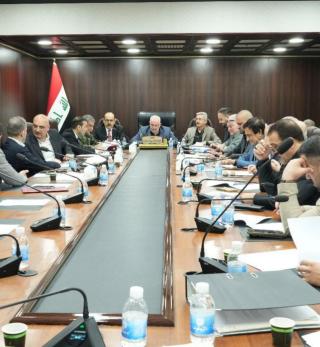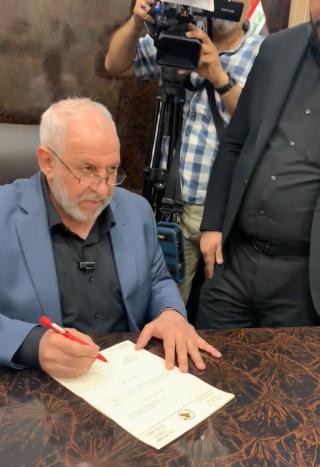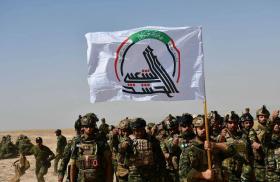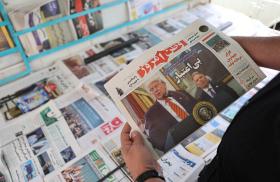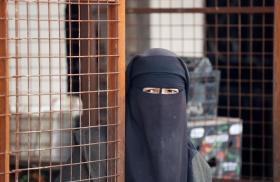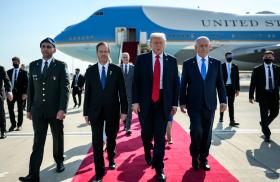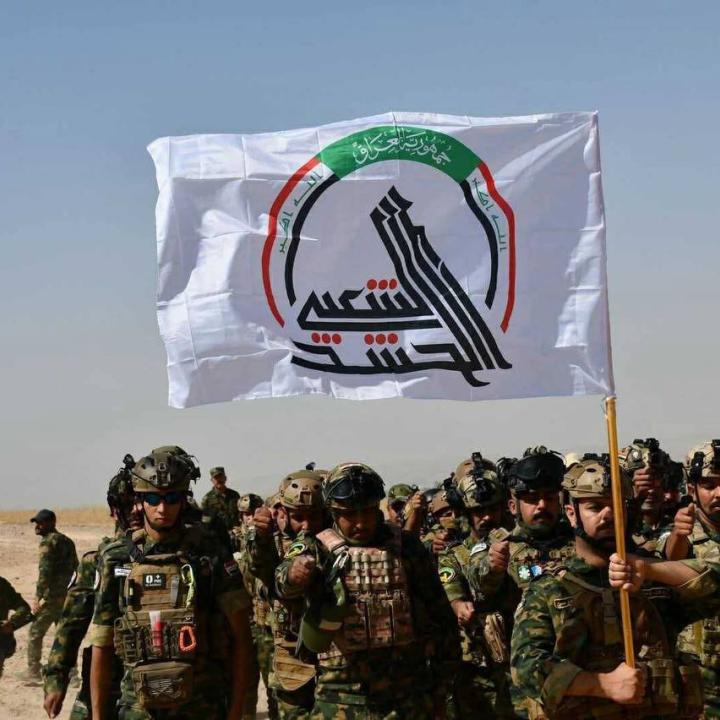
Threatened Militia Escalation Related to the PMF Draft Laws

Iran-backed terrorist militias are upping their threats against the United States and Iraqi minorities in the event the PMF is not made into a permanent institution.
Two pieces of legislation regarding the Popular Mobilization Forces are ready for a parliamentary vote: the implementing legislation for the PMF as a permanent institution, and the PMF service and retirement law. If passed, this package would take the PMF from a temporary prime minister’s commission—which requires year-on-year allocation of its funding in each budget—to a permanently funded institution such as a ministry or independent body.
The United States has firmly and clearly warned against the passage of both laws. In a July 22, 2025, phone call and a supplemental letter, U.S. Secretary of State and National Security Advisor Marco Rubio directly warned Iraqi Prime Minister Mohammed Shia al-Sudani about “serious U.S. concerns with the Popular Mobilization Commission (PMC/PMF) bill currently pending in the Council of Representatives,” and warned that the law would “institutionalize Iranian influence and armed terrorist groups, undermining Iraq’s sovereignty.” The private letter reportedly added that passage of the bills would “change the trajectory of the U.S.-Iraq relationship” and trigger economic sanctions, including within Iraq’s energy sector.
Near-Miss with Disaster on August 2
Ambassador Steven Fagin, U.S. chargé d’affaires in Baghdad, reiterated these concerns directly with senior Iraqi politicians throughout late July and early August, bringing particular pressure on First Deputy Speaker Muhsin al-Mandalawi on August 2. On that day, the Coordination Framework (CF) appears to have got within 15 seats of a quorum (i.e., 149 out of the required 164). In a highly unusual step, Mandalawi publicly shared the names of nonattending parliament members and imposed absence fines on them in an effort to draw more into the chamber—an effort widely seen as an intimidation tactic backed by the self-styled muqawama (resistance). A Badr-linked “independent” who publicly treads on the U.S. flag, Mandalawi has also worked closely with U.S.-designated Foreign Terrorist Organization Asaib Ahl al-Haq (AAH). As the below sections note, the effort to pass the PMF draft laws was a highly coordinated push involving terrorist groups Kataib Hezbollah (KH) and AAH, the Iran-formed Badr Organization, Deputy Speaker Mandalawi, Iranian officials, and a range of Shia Iraqi lawmakers.
KH Threatens U.S. Presence in Iraq
The muqawama threatened not only Iraqis in relation to the legal package but also U.S. persons. On July 23, in a direct response to Secretary Rubio’s comments, the online persona known as Abu Ali al-Askari, linked to the security chief of KH, issued a strongly worded statement suggesting that U.S. troops had failed to meet prior withdrawal agreements: “The agreement of the Islamic Resistance in Iraq with the Prime Minister regarding the withdrawal of American forces from Iraq has only two months left. We have not yet noticed any change in the current situation of the American forces. Therefore, the government must commit to what we agreed on of full withdrawal from the Joint Operation Command (FOB Union III), the airport (Baghdad Diplomatic Support Centre-BDSC) and al-Asad Airbase, and their planes must be removed from Iraqi skies. We gave him ample time and opportunity, but there must be firm adherence, or we will have a different stance” (see figure 1).
AAH Threatens Iraqi Minorities
On July 27, Ali Turki of AAH’s parliamentary bloc, al-Sadiqoun, accused Sunni and Kurdish parliament members of obstructing the bill. He stated: “We have begun to hear some Sunni and Kurdish objections, driven by Americans, against [the] PMF Law...The entire Shia bloc in parliament supports passing [the] PMF Law.” Turki also followed KH’s narrative on U.S. troops, issuing a subtle but inflammatory call to action by noting that “the Americans have been increasing in number in Iraq recently” (see figure 2). (Ali Turki is a regular feature of Militia Spotlight coverage, and most famously termed Sudani's government "a muqawama government" just months into its rule.)
Militia Coordination Ahead of the Vote Attempt
On July 30, members of the parliament's Defense and Security Committee held a closed meeting with PMF representatives (see figure 3). Participants included committee chair Karim al-Mohammadawi (of Badr); Badr-breakaway, now pro-AAH lawmaker Salah al-Tamimi; another Badr-leaning “independent,” Yousif al-Kilabi; plus KH’s Hossein Moanes, widely seen as the real-world person behind the Abu Ali al-Askari online personality. Representing the PMF was the PMF secretary-general Abu Muntadher al-Husseini (birth name Tahseen Abid Murat al-Abboudi), the organization's former chief of operations, who aided PMF Chairman Falah al-Fayyad in the murder, torture, and abduction of protesters in 2019.
In a further sign of urgent coordination, Iran’s Islamic Revolutionary Guard Corps–Qods Force (IRGC-QF) commander, Esmail Qaani, also moved through Baghdad ahead of the attempted August 2 passage of the bills. On August 3, lawmaker Karim al-Mohammadawi submitted a formal letter to the parliamentary speaker requesting inclusion of the PMF laws on the legislative agenda (see figure 4). Though the issue may appear to have gone off the boil as of August 5, any meeting of parliament that achieves a quorum could now see a sudden effort to bring the laws to a vote. Iraqi-U.S. relations are set to live on a knife’s edge now until the pre-electoral expiry of parliament on or around October 11.

